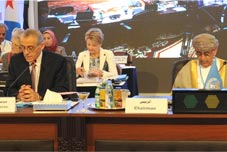 7 October 2015 -- The 62nd session of the Regional Committee for the Eastern Mediterranean continued its discussions yesterday in Kuwait on regional and global strategic health priorities. The day's sessions focused on implementation of the United Nations General Assembly Political Declaration on the Prevention and Control of Noncommunicable Diseases with a focus on tobacco use in the Region; global health security with a special emphasis on Middle East respiratory syndrome coronavirus (MERS-CoV) and avian influenza A(H5N1); implementation of the International Health Regulations (2005); and emergency preparedness and response to address ongoing and protracted crises in the Region.
7 October 2015 -- The 62nd session of the Regional Committee for the Eastern Mediterranean continued its discussions yesterday in Kuwait on regional and global strategic health priorities. The day's sessions focused on implementation of the United Nations General Assembly Political Declaration on the Prevention and Control of Noncommunicable Diseases with a focus on tobacco use in the Region; global health security with a special emphasis on Middle East respiratory syndrome coronavirus (MERS-CoV) and avian influenza A(H5N1); implementation of the International Health Regulations (2005); and emergency preparedness and response to address ongoing and protracted crises in the Region.
In terms of noncommunicable diseases, WHO highlighted work in promoting physical activity and the importance of healthy diets, reducing salt and trans-fats in food, and implementing the International Code of Marketing of Breast-milk Substitutes. A recent WHO initiative aims to prevent the unopposed marketing of unhealthy food and beverages to children. Tobacco control efforts were also discussed. With the growth in the world's population, the number of smokers is expected to increase along with the number of those killed by tobacco-related diseases. The Eastern Mediterranean Region is expected to see the biggest increase in tobacco use among all WHO regions. Raising tobacco taxes is one of the most effective tobacco control measures. Tobacco taxes in the Region are among the lowest in the world with reluctance to raise taxes predicated on the myth that increased tobacco taxes will increase illicit trade in tobacco products and disproportionately affect the poor. And yet, the devastating impact of tobacco use on people’s health, leading to lost productivity, increased health care expenditure and premature death, are far more costly.
The emergence of MERS-CoV in the Middle East and the recent surge of human infection from the highly pathogenic H5N1 virus in Egypt currently pose 2 of the biggest threats to global health security since the outbreak of Ebola virus disease in West Africa. These emerging health threats have highlighted the need for countries to strengthen and maintain their public health systems to prevent, detect and respond to emerging health threats, as part of countries' shared responsibility and collective accountability to protect global health in accordance with the International Health Regulations.
The Region is facing an unprecedented scale of humanitarian crises with more than half of the countries and 60 million people in the Region affected by emergencies and in need of humanitarian aid. The Region is hosting 6 million registered refugees and 21 million internally displaced persons. Syrian Arab Republic, Iraq and Yemen have all been designated as Level 3 crisis – the highest level on the emergency scale. To ensure organizational capacity and flexibility to respond in an evolving environment, WHO has been reviewing the way it works in emergencies to be better equipped to respond and save lives.
Discussions highlighted the importance of multisectoral approaches to improving public health that involve non-health sectors, the private sector, nongovernmental organizations, patients and families.
Related link
62nd session of the Regional Committee


